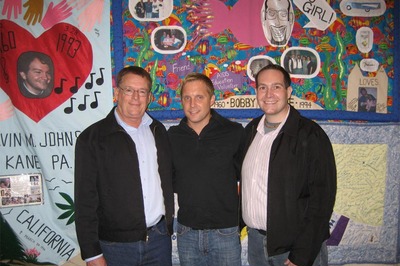Cleve Jones visited a Northeastern Pennsylvania college last week, relaying the lessons he’s learned in his nearly 40 years as an LGBT activist to a large crowd of students, faculty and staff.
Jones’ Sept. 10 visit to Keystone College coincided with a three-day exhibit of panels of the NAMES Project AIDS Memorial Quilt, a project Jones created in 1985 to commemorate the lives lost to the disease.
Jones addressed about 500 Keystone College community members in the school’s theater, talking about a range of LGBT issues and the progress the community has made over the past several decades.
“I think it’s important for young people, gay and straight alike, to know our history. It’s not taught in a lot of schools yet, so I’m always grateful when schools provide opportunities like this,” he said.
Jones, who has presented similar lectures at high schools and colleges around the nation, said many audience members were curious about his work with Harvey Milk, highlighted in the biopic “Milk,” released last fall.
Jones said it’s integral for LGBT and ally students to hear personal stories about Milk and other activists, and the struggles they faced, in order to help them understand where the community has come from and where it’s headed.
“Young people need to know the community’s history and learn about these role models,” he said. “And even for the straight kids, it’s important for them to see that LGBT people have always been a part of this country and always been a part of our culture. The more exposure that young people can get and the more opinions and experiences that they see, the better educated they can truly be.”
Jeff Brauer, Keystone professor and adviser to student LGBT and ally group Opposing Prejudice Ending Negativity, which spearheaded the effort to bring Jones to campus, said the AIDS Quilt display and Jones’ discussion about the early AIDS epidemic also hit home for the students.
“I keep hearing over and over again from students that they had no idea that the AIDS epidemic was ever that bad or of that magnitude or that it’s still bad. They’re just shocked by the whole story of it,” he said. “Before Cleve came, I asked all of my classes — about 125 students — if they’d ever heard of the quilt, and only about two or three of them had.”
Brauer noted the students’ lack of exposure to the history of the HIV/AIDS epidemic could be putting young people at further risk for acquiring the disease.
“The message is getting lost and translating into a lack of know-ledge that HIV infections are still out there and still something that students need to be concerned about,” he said. “We’re hoping that bringing Cleve and the quilt gets that message to them that this epidemic is real and it’s still around.”
Jones said that some students were “mystified and moved” by the quilt, and that he met several guests who’d lost family members and friends to the disease.
“That is always a very poignant experience for me personally,” he said.
Jake Kaskey, policy and outreach coordinator for Equality Advocates Pennsylvania, who opened the event and spoke about the local LGBT-rights movement, said Jones’ remarks were eye-opening for many in the audience.
“Many of these students that came to hear Cleve speak had little understanding of the depth of discrimination and hardship that LGBT people and people living with HIV face on a nearly daily basis, and left his discussion with a different perspective and better understanding of issues of great importance to the LGBT community,” Kaskey said.
During the event, Equality Advocates collected more than 100 letters that will be sent to state legislators, urging them to support HB 300 and legislation that would reinstate hate-crimes protections for LGBT people.
Jones also geared part of his discussion toward next month’s March on Washington, D.C., of which he is a strong proponent.
He said he supports the initiative because he believes the LGBT community should be looking to the federal — not state — government for lasting change.
While Jones, who grew up outside of Pittsburgh, acknowledged the Keystone State still has a way to go on LGBT rights, he said that can’t be achieved until progress is made at the federal level.
“I know there’s a great deal of very-conservative thought here in Pennsylvania. But whether you’re in Pennsylvania, Arkansas, California or Rhode Island, we need to be thinking about the federal government,” he said. “True equality can only come from the federal government. For strategy, we should look to 1963 and 1964 and the heroes of the civil-rights movement, who knew they had to keep fighting in Birmingham or in Selma, but that real victory could only come from Washington. That’s where we are now.”
Jones said he has been “taking heat” for this idea and for his support of the march, which has been met with mixed reaction from the LGBT community.
He insisted, however, that “a focus on state-by-state and county-by-county struggle is just a struggle for crumbs. I’m sick and tired of that. We need new leaders and a new strategy, and we need to stop settling.”
Jen Colletta can be reached at [email protected].

